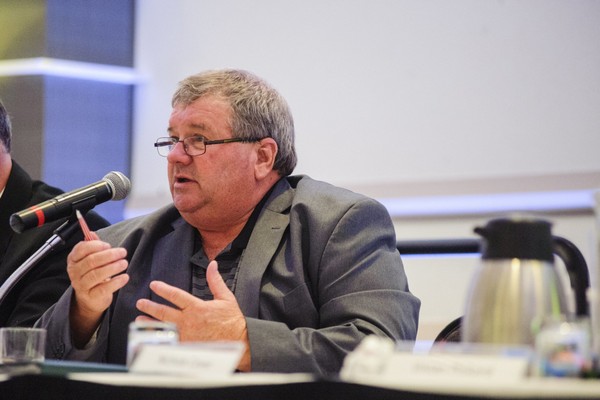Concerns over marijuana licensing board chair's past cloud future
Updated on October 25, 2017 at 9:13 AM Posted on October 25, 2017 at 8:30 AM
Rick Johnson, chairman of the Medical Marijuana Licensing Board pictured during its Oct. 17, 2017 meeting in East Lansing. (Kaytie Boomer | MLive.com)
By
Emily Lawler
elawler@mlive.com
By Emily Lawler and Craig Mauger
LANSING -- What happens when a long-time lobbyist, described as a guy "everybody knows," helps pick who gets a slice of an $837-million developing industry? Michigan is about to find out.
Rick Johnson was once the speaker of the Michigan House. He then spent a decade as a registered lobbyist in Lansing. Now, he's the chair of the new Medical Marihuana Licensing Board, the board that will choose which businesses get licenses to grow, transport and sell medical marijuana in the state.
Some view Johnson as an ethical broker who will enforce state application requirements with an even hand. But others are concerned that Johnson's deep connections to Lansing's business elite could impact his decisions.
While Johnson has repeatedly denied he has any conflicts of interest, an investigation found at least one of Johnson's former lobbying clients is considering pursuing a license from the Johnson-led board. Johnson also has multiple other connections with those who could seek to influence the process.
Under Michigan's new medical marijuana law, businesses that want to be part of the industry need authorization from the five-member licensing board. Gov. Rick Snyder formally appointed Johnson chair of the board on May 26. Johnson terminated his lobbyist registration in November 2016, but his past has inspired concerns from some, like Sen. Rick Jones, a Republican from Grand Ledge.
"I wanted the board to not only be squeaky clean, I wanted it to have all of the appearance as being squeaky clean," Jones said. "In my mind, you would never have a former lobbyist on that board."
Emails obtained by MLive and the Michigan Campaign Finance Network show a pattern of influence.
Less than a week after Johnson's appointment became official, a Texas businessman met with officials within the Department of Licensing and Regulatory Affairs (LARA) about his interest in medical marijuana, according to a LARA spokesperson. That businessman, Robert Joe Tondu, also owns an energy generation plant in Michigan and had previously paid Johnson to lobby on his behalf in Lansing.
In a Sept. 12 interview, Johnson initially said he had no former clients who were looking to get licenses from the board he leads. Then, asked specifically about Tondu's interest, Johnson responded that he worked for Tondu on energy issues only, and that he hadn't done any work for Tondu for more than year.
He also said that he wasn't sure that Tondu was definitely getting into the marijuana business.
"I don't see a conflict with anyone," Johnson continued. "Here's why: We as a board, we really don't have a hell of a lot of control over it. If they fill out the application, pay the fees, follow every letter of the application, we say yes. If they don't, we can say no."
However, state law allows the board some wiggle room to consider more subjective criteria, like an applicant's moral character or an applicant's financial ability to maintain a medical marijuana facility.
In an interview, Tondu said he is unsure whether he will apply for a license, invest in another applicant's business or decide against pursuing an investment in Michigan altogether. The application window doesn't open until Dec. 15.
Tondu said he has never discussed his medical marijuana business plans with Johnson. He did, however, say he congratulated Johnson on his appointment to the board.
"Everybody knows Rick Johnson," Tondu said in a phone interview. "Do I get an advantage? I am going to go through LARA and the four other members. All he's going to be able to say is I know this guy ... and he's honest."
Science Inspired Tondu'
s Interest
At this point, Tondu's interest in medical marijuana is the clearest connection Johnson appears to have with a potential applicant for a license.
The connection only became apparent through a Freedom of Information Act (FOIA) request of email exchanges between a group of registered lobbyists and LARA officials. According to the emails, Lansing-based lobbyist Manny Lentine wrote a message on May 17 to ask state regulators to meet with a client he said owned an energy generation facility in Filer City, south of Manistee.
"Joe is finalizing his business plan and discussion with you will help establish his comfort level or cause him to think things through differently," Lentine wrote in his email to state officials, referring to Tondu. "Not looking for anything confidential in anyway, which I know you would not provide if even asked."
Lentine, who represents multiple medical marijuana-interested clients, did not respond to a request for comment. But Jason Moon, spokesperson for LARA, confirmed a meeting with Tondu took place on June 1.
In an interview, Tondu said the science behind medical marijuana first got him interested in the field. He's travelled to Colorado, Canada and elsewhere to study it, and he's trying to determine if there's an opportunity for him in the industry, he said. He's been approached by dispensary owners about investing in their businesses and he's been approached by others about using the property he owns near his Michigan power plant for a medical marijuana business, Tondu said.
"I haven't decided if I am going to or not," Tondu said of getting into the industry. He added that he wants to see the state's final administrative rules for medical marijuana businesses, which will likely debut in December.
Johnson said he did work for Tondu three or four years ago, and then about two years ago he helped on negotiations for a new contract between Tondu and Consumers Energy, which uses energy generated from Filer City. Johnson said his work on that deal was completed about a year ago.
Tondu said Lentine has been his full-time lobbyist and that he's paid Dodak Johnson and Associates, Johnson's old firm, a "small amount" to also lobby for him. Tondu didn't recall an exact amount but he mentioned the rough figure of $500 a month.
Lentine is also listed as a resident agent for R Johnson, LLC, a limited liability company Johnson occassionaly lists as his employer on campaign contributions, according to state filings.
Financial Disclosure Filed Months After Appointment

The Medical Marijuana Licensing Board at its Oct. 17 meeting in East Lansing. (Kaytie Boomer | MLive.com)
Under the 2016 medical marijuana law, the licensing board itself can't hire anyone who's worked in the last three years for someone who's applied for a license. The law is unclear on whether that provision includes board members themselves.
But that's just one of the law's provisions that seek to prevent conflicts of interest among medical marijuana regulators, including a requirement that licensing board members turn in disclosures listing their personal financial interests. The law directs those disclosures go to the governor's office, which is not subject to FOIA, meaning there is no requirement that the disclosures be shared with the public.
The governor's office has declined to voluntarily release Johnson's disclosure. But a spokesperson confirmed Johnson turned his disclosure in only recently, on Sept. 18, 116 days after Johnson was officially appointed by Snyder, and after he had already taken part in three public board meetings. The other four board members, the governor's office said, turned their financial disclosures in during the months of June and July.
Anna Heaton, spokesperson for the governor's office, said Johnson had previously turned in a separate form on potential conflicts of interest. She also noted that the board will not begin receiving license applications from anyone until December.
However, Jones, who chairs the Senate committee that worked on the medical marijuana law, said he didn't understand why Johnson had been appointed at all before that disclosure was filed. Jones said his understanding was that the disclosure was part of the rules for the appointments.
"I think it's outrageous that he got appointed to such an important position without following the rules as I know them," Jones said.
There are medical marijuana patients and business owners who would like to know more about Johnson's financial interests. Rick Thompson, of Flint, has been a long-time medical marijuana advocate and he's written about medical marijuana policy in the state since 2009. He said Johnson's appointment to the licensing board raised even more suspicion of large businesses' influence in the medical marijuana rulemaking process.
"In the medical marijuana community, we're very concerned about the involvement of lobbyists," Thompson explained, adding that someone on the board could shift policy to favor a certain business in ways that aren't obvious.
Johnson's many connections
In addition to his relationship with Tondu, Johnson, a farmer from Leroy who began serving in the House in 1999, has other connections to those interested in medical marijuana policy.
For example, Johnson serves on a community organization called Friends of Evart in his home area with southeast Michigan businessman Robert Barnes, one of the owners of Belle Tire. Johnson said he's known Barnes, who also owns a luxury game reserve in Evart, for about two years.
Barnes and his brother, Donald Barnes Jr., registered a new business in Michigan called Weed Rx on May 8, according to a state filing. Bill Nowling, a spokesperson for the Barnes family, said Weed Rx is not affiliated with Belle Tire and was formed "in the event they should ever enter the legal medical marijuana industry."
Johnson said he wasn't aware of any plans Barnes has to get into the medical marijuana business.
In addition to knowing people who may pursue a license, Johnson said, as a lobbyist, he also worked on the bills that ultimately became Michigan's medical marijuana law and the bills that created the licensing board on which he now sits. Johnson did not elaborate on his role, but said he did not have a paying client, but rather did so for personal reasons. Lawmakers who led the legislation in the House and Senate said they did not recall Johnson's involvement.
However, a photograph shows Johnson at the bill signing for the legislation, posing for a picture with Snyder; four other lobbyists; Republican consultant Steve Linder; a business owner; and the package's primary sponsor, former Rep. Mike Callton, R-Nashville. Snyder and Callton are holding one of the bills in the photograph.
At the time, Johnson was a partner in the lobbying firm Dodak Johnson and Associates. Since then, Johnson has handed control of his old lobbying firm to his former partner, Lew Dodak, who is also a former state House speaker.
Because of Johnson's new position, Dodak said in an interview that his firm won't take medical marijuana clients while he's in charge of it.
'You Cannot Erase Your Prior Relationship'
Multiple sources, including Dodak, interviewed for this story spoke highly of Johnson's personal ethics.
Johnson himself said in an interview that he would tell people he's had previous relationships with to "follow the rules." Johnson said he's even advocated for an anonymous application process, in which applicants' names would be kept secret from the board members considering the applications. However, Johnson said he was told the board couldn't do that.
But an anonymous process is still a possibility, according to Andrew Brisbo, director of the state's Bureau of Medical Marijuana Regulation. In an interview, Brisbo said it's possible that the board could examine applications with the applicants' names redacted. Before making a decision, the bureau has to evaluate how practical it is to redact names from the "voluminous applications" that are expected to come in, Brisbo said.
Johnson said he doesn't care whose names are on the applications.
"All I really care about is the patients and making damn sure they get treated right," Johnson said.
His former partner, Dodak, said he would have no concerns about Johnson's role on the board.
"Ethically, he's 100 percent on the high side," Dodak said.
Likewise, former Rep. Ed Gaffney, a Republican from Grosse Pointe Farms, who served in the House with Johnson, said he never saw Johnson do anything unethical.
"Of all of the people in Lansing, I think he would be one of the most fair," Gaffney said.
But Gaffney, who served eight years on the Liquor Control Commission, did voice concerns about Johnson's connections to individuals he could soon be licensing. The Liquor Control Commission regulates the liquor industry.
Serving on a regulatory board, Gaffney said, it would be difficult to be objective when considering an application from someone a board member previously worked for.
"In your gut, you cannot erase your prior relationship," Gaffney said.
Gaffney called boards like the Medical Marijuana Licensing Board and the Liquor Control Commission "extremely important."
"They have great power," he said. "They can either put somebody's business out of business or with their action allow somebody to make millions of dollars."



